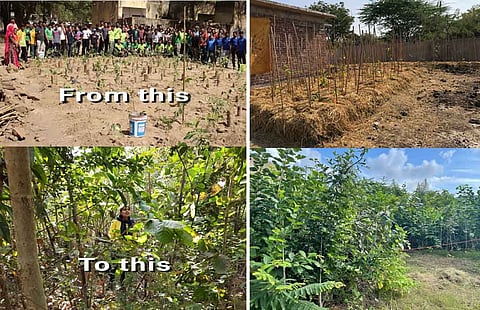
In the picturesque city of Udaipur, a unique and inspiring trend has taken root among its residents. Recognizing the impossibility of living in an actual forest, the people of Udaipur have embarked on a remarkable endeavor—they are creating tiny forests right in their own backyards. More than 4 thousand trees have been raised in past 4 years by creation of such tiny forest spaces.
Inspired by the idea of bringing the enchantment of a forest to their dwelling places, Udaipur's citizens are cultivating lush green havens filled with native trees and plants.
Astonishingly, even with as little as 100 square meters of space, they are transforming their properties into thriving mini forests, reaping the numerous benefits that nature has to offer. This innovative initiative not only adds to the natural beauty of Udaipur but also allows individuals to immerse themselves in the wonders of a forest without having to venture far from home.
The owners of mini or tiny forests claim that the initiative has significantly reduced their stress levels. They find joy in witnessing the presence of birds, butterflies, insects, and reptiles in their backyards.
The inspiration for this initiative comes from the work of Japanese botanist Dr. Akira Miyawaki, who developed the Miyawaki method for restoring indigenous forests.
The first tiny forest in Udaipur was established in May 2019 at the District Institute for Education and Training (DIET) office in Goverdhan Vilas. The project was sponsored by Abbas All Bandookwala, a senior citizen, who was motivated by his daughter's desire to plant trees instead of spending money on extravagant birthday celebrations.
Bandookwala told The Mooknayak that he invested around Rs 15 lakh and actively participated in the tree planting session. He chose a public place for the forest to maximize its impact, as he believed that making it accessible to the public would inspire others to follow suit.
Jatin Suhalka, a businessman who owns a farmhouse in Dabok, describes the experience of owning a forest as truly delightful. He spends hours wandering among the trees, some of which have grown up to several feet high. In May 2019, Jatin began planting saplings for his mini forest, incorporating over 350 native plant varieties, including mahua, mango, bahoda, kachnar, and kockar, all indigenous to the Aravalli range. The fruit-bearing anjeer tree has already brought joy to his family, who regularly visit the farmhouse to enjoy nature's bounty.
Vinu Hiran, a nature enthusiast, is also pleased with her mini forest. She believes that having a private green space in the city is a delightful experience, as spending time amidst the plants has therapeutic effects. The forest owners derive pleasure from observing birds nesting, squirrels frolicking, and colorful butterflies fluttering around.
Bhuvnesh Ojha from the Pukar Foundation, an organization assisting people with plantation efforts, explains that a tiny forest can be created on a minimum area of 2020 sq ft, accommodating 40 varieties of native trees.
Bhuvnesh told The Mooknayak that so far 4 thousand native varieties of trees have been raised in 8 mini forests in and around the city.
40 percent of these created tiny forests are in homes and residential spaces while the remaining are grown in farm houses situated in the outskirts of the city.
The organisation has collaborated with other institutions in creating 20 similar miyawaki forests across India including Chandigarh, Hyderabad, Bhopal, Rajkot and Delhi too. The cost to make a forest in 100 sq meter area would fall around 80 thousand rupees to 1 lakh. Along with the growing of trees the organisation is stressing on integrated approach that includes rain water harvesting as well as growing grasslands too so as to promote soil conservation.
"Udaipur is witnessing the growth of mini and tiny forests as residents actively contribute to restoring indigenous plant life. These green havens not only enhance the natural beauty of the city but also provide a sense of peace and harmony to those who nurture them " says Dr Arti Prasad who herself is a nature enthusiast and has a large varieties of plants and trees at her home. Though it is not typically a Miyawaki forest but Arti's home has a completely covered by the green vegetation.
You can also join our WhatsApp group to get premium and selected news of The Mooknayak on WhatsApp. Click here to join the WhatsApp group.